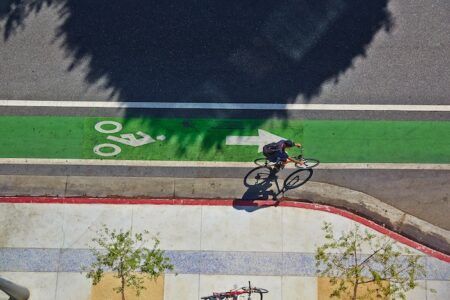Norwegian tolling and traffic technology giant Q-Free has launched a trial project for piloting a new smart parking sensor, in collaboration with one of the world’s largest mobile and communications providers, Telenor, and the Norwegian Public Roads Authority (NPRA).
The Q-Free pilot will test and use the new Narrow Band Internet of Things (NB IoT) communications technology with its parking sensors. Q-Free, is one of the first in Europe to have its outdoor parking sensors communicating in real time with narrowband communications technology.
The testing will take place at NPRA’s park-and-ride facilities on the way into the city of Trondheim. The parking sensor is a small and robust unit that is easily installed in the ground at each parking space, using radar-based technology to sense with 99% accuracy, whether a vehicle is present in the space. The sensor then transmits the parking space availability information using NB IoT communications, which can be further sent to a variety of outputs, such as variable message signs (VMS) located near the parking site, or straight to end users through websites or smartphone applications.
The pilot was intentionally launched in January, typically the month with the most extreme weather conditions, particularly in Trondheim where the sub-zero temperatures and high chances of snow and ice provide a good test of the technology’s robustness. The new Q-Free parking sensor provides a strong communication outlet in real time, with a battery lifetime of 10 years.
The new smart parking sensor complements Q-Free’s current parking technology portfolio by allowing parking operators to monitor the occupancy of both indoor and outdoor parking areas. Robustly designed, the sensor is strong enough to withstand the weight of heavy vehicles consistently driving over it, as well as the impact of a snow plows clearing the road.
Q-Free is planning on further customer pilots to test larger volumes of the new sensors, in preparation for the product’s largescale release later this year. The NPRA spoke of the benefits of the new sensor at the launch, and also expressed the importance of having accurate statistics for which parking spaces are available and when.
“The main challenge for smarter city concepts today is that each project needs a separate infrastructure in place to ensure wireless communication from sensors to the back office systems,” explained Q-Free’s research director, Anders Hagen. “This leads to high installation and operational costs, as well as potential frequency conflicts. This project will enable cellular-based NB IoT communication using existing infrastructure, which will be a large step in the right direction toward realizing next generation smarter city connectivity.”
Kristina Bergstad, Q-Free’s vice president of service line parking, was equally optimistic about the pilot project: “It is good that we can test this technology early on, and be ready to launch this kind of solution much sooner than our competitors, knowing that the tested equipment provides high accuracy and reliability. We are very excited to be part of this cooperation with Telenor, where our smart parking sensors will interact directly with their base stations.”




